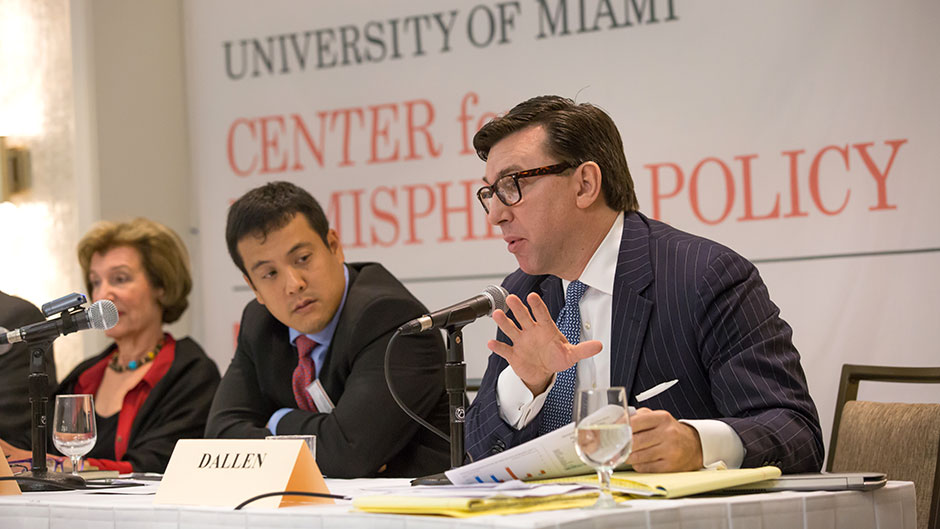Venezuela, everyone agreed, is a mess, both economically and politically.
Two panels of South American experts, hosted by the University of Miami’s Center for Hemispheric Policy in the Hyatt Regency Coral Gables, debated the issue at a recent gathering in a discussion titled, “Venezuela: A Deepening Political and Economic Quagmire?”
Economically, Venezuela relies heavily on oil production, but despite its vast holdings has been unable to produce as many barrels as some of the top oil producing countries in the world, such as Saudi Arabia.
Politically, panelists agreed there needs to be a change in regime, but disagreed with how to go about it or how long it would take.
“Venezuela is producing 2.3 million barrels where the majority is used domestically and the rest is used to pay back debts with oil,” said Russell Dallen, editor-in-chief of the Latin American Herald Tribune. “At this point, their gold is probably just painted lead.”
Dallen pointed out that it’s not easy to get out of this predicament since the government controls the oil so much to pay back debts, there’s not enough money in the country to provide enough food or housing.
Francesco Rodriguez, a Venezuelan economist, recognized that oil isn’t the only problem for the country, but is a mixture of different factors.
“With inflation rising, higher prices, a higher exchange rate and printing more money… even the poor realize it’s better to buy 5 kilos of ‘harina’ [cornmeal], keep two and sell three on the black market,” Rodriguez said.
The poor have also had to make adjustments to the failing economy since there are more exports than imports. Many have had to wait in lines at supermarkets for six to eight hours a day to receive rationed food.
“The government is having an identity crisis. They’re afraid of political change so they’re implementing more inspections and price control as a result,” said Richard Obuchi, professor in the Instituto de Estudios Superiores de Administracion in Caracas, Venezuela.
Obuchi believes if the government were to change the high prices on products and exchange rates, instead of controlling how expensive goods are, Venezuela’s economy could recover but “President Nicolas Maduro doesn’t seem to be ready for change.”
Politically, Javier Corrales, professor and chair of political science at Amherst College, optimistically believes that the best hope for the country is “the strength of the opposition.”
“There is a degree in unity that you don’t see in other Latin American countries,” said Corrales. “Their effective strategizing, deal-making and being pragmatic have helped them come to many agreements.”
He also acknowledged that it helps that the international reputation of Maduro’s regime has fallen a bit and he has indirectly helped the opposition by not trying to negotiate with them.
“If he were to negotiate with the opposition, that’ll already create a split among them because they won’t agree on what to do,” said Corrales. “This just convinces me that Maduro is economically and politically deficient. He’s letting them thrive.”
On the other hand, Beatrice Rangel, former chief of staff to President Carlos Andres Perez from 1991 to 1993, believes the regime will collapse, not because of the opposition, but because it is in Venezuela’s DNA to fail.
“History shows the country goes from great to bad and we’re approaching the chaotic part of the cycle. Someone will come in, do peace, and take over,” said Rangel. “This change will only happen when an elite’s business is affected and they’ll do something about it.”
Opposing everyone’s views, Otto Reich, president of Otto Reich Associates, believes the only solution to Venezuela’s economic and political problems is to switch focus.
“The only question is, is an economist’s practical advice (on how the country can recover) going to weigh more than a Cuban’s advice that to give up price control? Maduro will have to give up power,” said Reich.
In turn, Reich mentioned that the U.S. should be more aggressive with its tactics, especially since Spain and Greece seem to be headed in the same political direction as Venezuela.
“We lack the political will to do anything about Venezuela,” said Reich.
As a result of the political and economic issues happening in Venezuela, many are fleeing the country and settling in the United States, including students.
“The education in Venezuela is so bad, if you look at the top schools in the world, Brazil is the first Latin American country on the list in spot 250,” said Dallen. “It’s the worst education, especially since they use Cuban Marxist textbooks to brain-wash students.”
Alina Zerpa can be reached at 305-284-5500.

